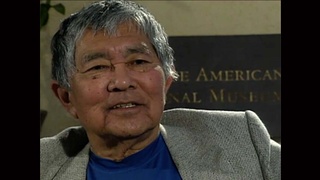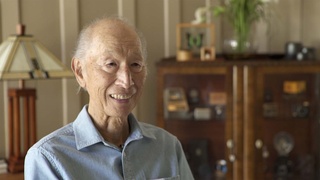Interviews
Learning Japanese with the MIS
And I worked in the office there—we were recruiting Niseis from all over in the California area. Well...and also BIJs (born in Japan), we had their addresses and we corresponded and got them interested in coming to the school and one day I told the colonel I was tired of the office work, could I go out in the field and learn Japanese. Because I associated with the Nisei kids that were drafted and I learned a little of the language from them. And then I was sent to Camp Savage, it's very close—in Minnesota—close to Minneapolis and there I learned more Japanese language and heigo, the military language, the Japanese military. And after I completed the courses at Camp Savage I was sent to the University of Michigan at Anne Arbor where they had a crash course for people that were learning Japanese to be used as interpreters and because they just didn't have enough and I was given a warrant officer—then from sergeant major to a warrant officer—which is not really a commission but it's above the ordinary soldier''s rank. And so all through that was about—the course was a year-long and we could speak nothing but Japanese, 24 hours a day.
Date: January 26, 2012
Location: California, US
Interviewer: John Esaki, Yoko Nishimura
Contributed by: Watase Media Arts Center, Japanese American National Museum







